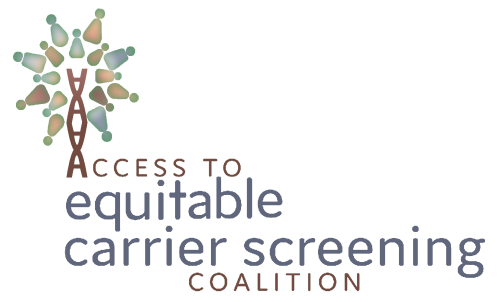PRESS STATEMENT: FOR IMMEDIATE RELEASE Contact: Taryn.Couture@PowersLaw.com
The Access to Equitable Carrier Screening Coalition (AECS), a multi-stakeholder coalition of laboratories dedicated to ensuring that individuals of reproductive age and their partners have access to equitable carrier screening, supports the American College of Genetics and Genomics (ACMG) updated Practice Resource on carrier screening for autosomal recessive and X-linked conditions.
With this updated Practice Resource, ACMG made an important update that acknowledges how advancements in carrier screening now enable individuals to understand their reproductive risks in a more equitable manner and make informed decisions based upon their personal values and preferences.
This ACMG’s Practice Resource recognizes the need for more equitable carrier screening, stating “carrier screening paradigms should be ethnic and population neutral and more inclusive of diverse populations.” ACMG guidance specifically no longer recommends an initial approach to carrier screening focused solely on Cystic Fibrosis, Spinal Muscular Atrophy, or ethnicity because it does not provide equitable evaluation. Instead, ACMG recommends all pregnant patients and those planning pregnancy should be offered carrier screening for conditions with a carrier frequency of >1/200, which encompasses over 100 inheritable autosomal recessive and X-linked conditions, and that payers should provide coverage for this level of carrier screening. This recommendation replaces ACMG’s previous guidance and position statements on prenatal/preconception expanded carrier screening from more than a decade ago.
“With a focus on equity, this Practice Resource from ACMG is a major step forward in recognizing changing trends in population demographics such as individuals who identify ancestral background as being from two or more races and the complexity in obtaining accurate self-reported ancestry and family history,” said Dr. Haywood Brown, board certified obstetrician and gynecologist and AECS Coalition Executive Medical Director.
Dr. Brown added, “By offering carrier screening irrespective of self-reported race/ethnicity, we are now able to provide important information to prospective parents that was previously only reserved for those who fit into socially defined constructs of risk.”
Shari Ungerleider, Project Coordinator for the Jewish Genetic Disease Consortium (JGDC), said, “This updated guidance from ACMG goes a long way in providing critical decision-making information to the patients we support. Having a child born with a rare disease and watching him suffer for years and eventually having him die in my arms, made me aware of the importance of carrier screening and ensuring it is available to all individuals.”
Ungerleider noted that, “The purpose of preconception carrier screening is to identify couples, preferably before pregnancy, and help them understand the impact of the diseases they carry on an affected child and to present reproductive options to the couple.” She said, “Offering this testing regardless of a person’s race or ethnicity ensures access to this information for all individuals and addresses previous limitations associated with ethnicity-based screening.”
